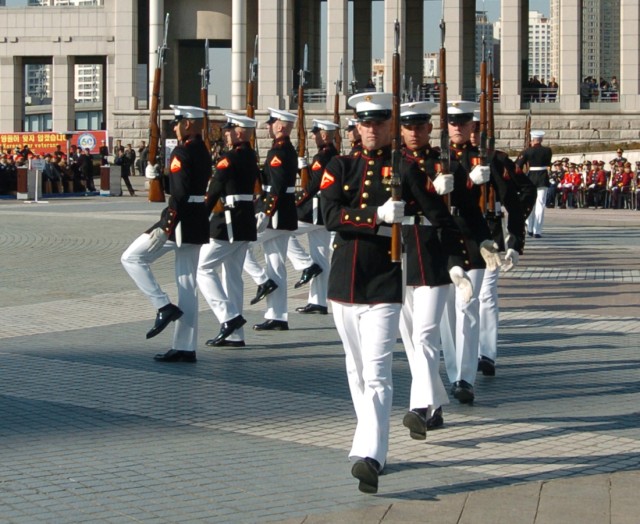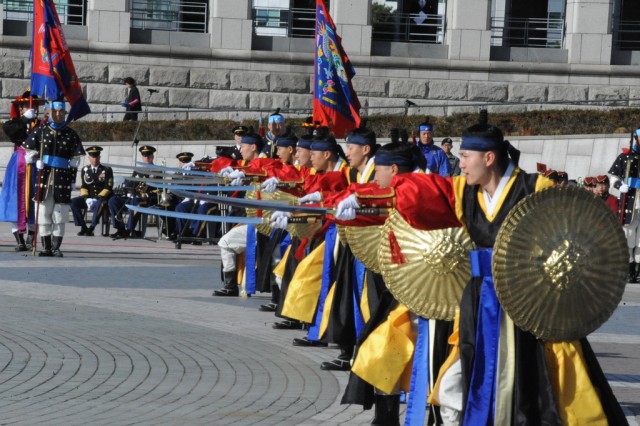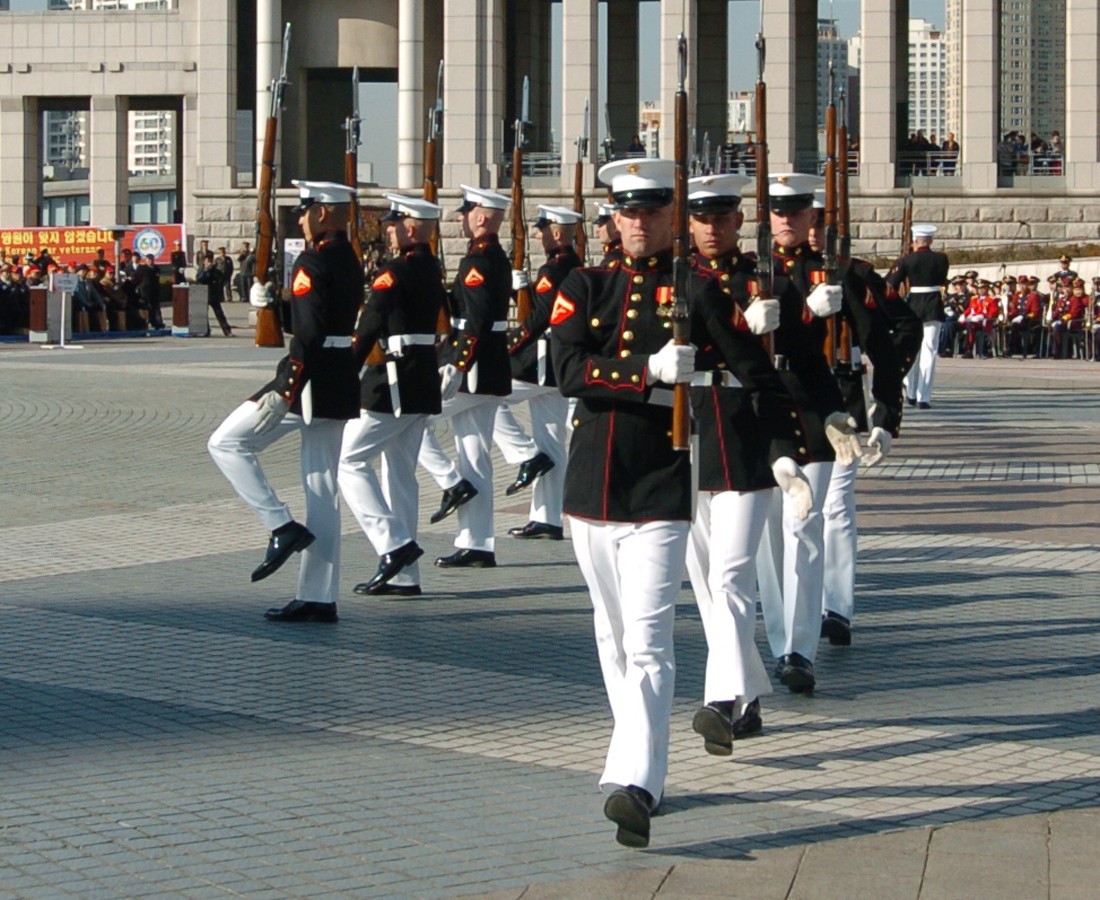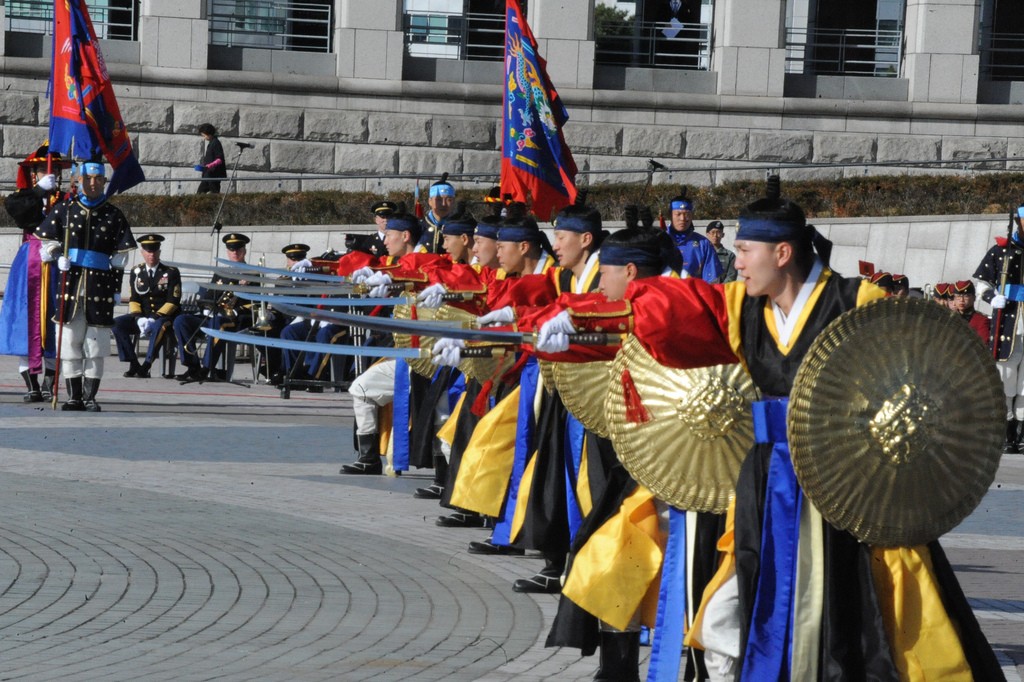SEOUL -- More than 250 veterans gathered here Nov. 10 to mark the 60th anniversary of the pivotal Jangjin "Chosin" Reservoir battle where U.S. Soldiers and Marines defeated a much larger enemy force during a strategic retreat through bitterly cold and fiercely contested mountainous terrain.
During a ceremony at the War Memorial of Korea, U.S. Army Gen. Walter L. Sharp, the top American commander in South Korea, praised the veterans who took on communist Chinese troops at the Jangjin "Chosin" Reservoir in late 1950.
Along with Republic of Korea Minister of National Defense Kim Tae-young, Sharp was one of the featured speakers at the ceremony. The ceremony also featured performances by the U.S. Marine Corps Silent Drill Team, a Korean dance group and the ROK Ministry of National Defense Honor Guard who demonstrated traditional sword and spear techniques dating back to the Joseon Dynasty.A,A
"I am truly honored to welcome the Korean War veterans," said Sharp, commander of the United Nations Command, Combined Forces Command and U.S. Forces Korea. "Whether you fought outnumbered in the bitter cold with X Corps or under the United Nations flag during any other part of the war, you are our honored guest here today. As your successors in maintaining peace and stability on the Korean Peninsula, we owe you a debt of gratitude that can never be repaid."
Sharp thanked all of the assembled veterans who "fought side-by-side to hurl back the human wave attacks and to protect the newly-established Republic of Korea."
"United Nations Command Soldiers, Sailors, Airmen and Marines fought not only the enemy but also the elements," said Sharp, the son of a Korean War veteran.
ROK Minister of National Defense Kim thanked the veterans for defending the Republic of Korea.
"Today, we have the great honor to be in the presence of the heroes of this battle," said Kim. "The Republic of Korea will always remember you."
Called the "Chosin" Reservoir by United Nations Forces using outdated Japanese maps, the Korean name of the reservoir is Jangjin. It was the site where United Nations forces defeated eight communist Chinese divisions during the battle that lasted from Nov. 27 to Dec. 13, 1950. More than 100,000 Chinese soldiers encircled 30,000 United Nations troops at the reservoir during one of the coldest winters in the history of the region.
The communist Chinese came to the aid of the North Korean forces after UN forces had pushed them all the way to the Chinese border, following Eighth Army's successful defense of the Pusan Perimeter and the 1st Marine Division and X Corps' amphibious assault at Inchon in 1950.
Heavily outnumbered and completely surrounded, Soldiers and Marines under the command of the U.S. Army's X Corps outmaneuvered and outfought the communist Chinese People's Volunteers in the teeth-cracking cold, where frigid winds and 40 below temperatures routinely caused weapons to malfunction.
During more than two weeks of tough fighting, communist Chinese forces attacked at night and fled during the day when U.S. air support was overhead. The U.S. Navy and U.S. Air Force also played a critical role in the battle, conducting fire support, resupply and medical evacuation missions.
"Korean, American and British units fought with a valor rarely seen in the history of war," said Sharp. "Our air forces parachuted supplies, ranging from ammunition to temporary bridges, to our hard-pressed Soldiers and Marines, while our naval forces provided fire support and logistics. All of the services worked together to fight one of the most successful rearguard actions in the history of combat."
Prevailing in intense ground combat and overcoming numerous man-made and natural obstacles, American Soldiers and Marines hobbled the much larger Chinese force, broke through their encirclement and made it to the North Korean port of Hamhung where they helped to evacuate more than 100,000 North Korean refugees to the south. The 78-mile journey was the longest withdrawal in U.S. military history.
During the battle, 14 Marines, two Soldiers and a naval aviator earned the Medal of Honor, the nation's highest military honor.
"The sacrifices that you made and the helping hand that you lent helped create a remarkably generous, prosperous, strong and free Republic of Korea," said Sharp. "Today, Korea is your legacy."
Sharp told the veterans that the U.S. forces in South Korea today continue to deter aggression and remain ready to fight and win, if necessary.
"We will never give up what you fought so hard to achieve," said Sharp.
Related Links:
Army.mil: 60th Anniversary of the Korean War




Social Sharing